Part
2 There's Only One Neil Redfearn - Results,
table and transfers
Massimo Cellino was bizarre and erratic, outspoken and excitable in the
extreme, his heart always butt naked on his sleeve.
When asked what was top of his huge to-do list at Elland Road, he looked
down at a sheet of paper, looked up again and chuckled, 'Kill myself.'
The only people Cellino had anything positive to say about were the supporters.
'It's important to say the truth. Don't say lies, don't say bullsh*t to
the fans. And their energy. And Leeds has got a lot of f***ing energy.
When I got there, 18 January, for the first time, I saw the match. They
lost 1-0. On the last minute. And I was there, I saw the fans, with the
f***ing club, in the Championship. So big, with 30,000 people watching
the match. And lost. And singing. Everybody happy with their family, I
said "What the f*** is that?" That's Championship. A f***ing team like
that. All the people that come here deserve a f***ing good team. I dream
in my mind, can you imagine I bring good players, we win, become Premier
League how good can be? You know? That's my dream.'
This was a man whom English football would find it almost impossible
to understand, let alone work with. And he selected Leeds United as his
vehicle for testing that relationship to its limits.
'I'm going to talk to Brian [McDermott],' said Cellino in the spring
of 2014 after a spat with the Leeds manager. 'We will speak to each other
100 per cent and I will speak to him honestly. There is so much going
on at Leeds and already I've changed my mind ten times about a lot of
things. But let me tell you, the coach is my last problem here.'
McDermott was widely rumoured to be on borrowed time at Elland Road.
Asked if he had approached potential replacements for the manager, Cellino
dismissed the suggestion out of hand yet courted Benito Carbone, the former
Bradford City and Sheffield Wednesday player.
Carbone, who retired in 2010, gave up his job coaching Italian side Saint
Christophe Valle D'Aosta when he was approached by Cellino. He was all
set to relocate to England though Cellino said it would be an unpaid role
in the short term, seemingly unconcerned about the impact of Carbone's
appointment on Neil Redfearn and other members of the Academy staff.
The news set the headlines spinning with intense speculation that Carbone
had been earmarked to replace McDermott. Glib forecasts from 'those in
the know' that Carbone would be the new man in charge were abruptly proven
wrong by Cellino. He severed contacts with his 'special consultant' at
the beginning of August. It was rumoured that Reading Academy boss Eamonn
Dolan would be the new head coach, but the cost of terminating his contract
proved prohibitive.
Instead, Cellino shocked the football world by appointing a total unknown,
former Forest Green Rovers manager David Hockaday, who left the Conference
side by mutual consent after a run of seven defeats in eight matches in
October 2013. He emerged from obscurity to rapidly become the bookies'
favourite and was duly revealed as the new man on 19 June to the astonishment
of virtually everyone.
At the press conference to announce Hockaday's appointment, Cellino strolled
in five minutes before the new man, quipping, 'He's gone already … I'm
here to present the new coach, manager or super manager, whatever. What's
the difference?'
'Someone told me about him and we met in a hotel in London one month
ago,' said Cellino. 'We talked for five hours about football. Five hours
talking, I didn't realise the time. We talked about position, players,
what we like - talked about football, not money, not bullsh*t. I found
a man who talked about football. I arrived here six months ago and I just
hear a lot of sh*t. Nobody talks about football. I got the impression
that he knows what he's talking about. I was looking for someone that
can teach the players how to play better and to work on the field. More
specialised - to work with the players, not speak with journalists. Today,
coaches worry more about the journalists than about playing soccer. It's
public relations. A very important thing in football is showbusiness,
we all know that. But at Leeds at the moment, to bullsh*t and show off
too much is not right. Here I was looking for someone who can help the
players because our players need to be helped. They need to improve and
they're hungry to learn. Even the players at 32, 33 - they need to work
every day. I was looking for a coach with that characteristic and I think
David has got it.'
The press conference heard classic Cellino: 'Coaches are like watermelons.
You don't know what you've got until you open them up. So the best way
of finding out if he's good is by working with him. I have good feelings.
I follow my instinct and my feelings tell me that this is the right man.'
back to top
When asked why he had chosen an unknown like Hockaday, Cellino said,
'I could have taken a big name and showed off. But then what would happen?
I can ask Mourinho to come here and give him £30 million, maybe he'd come
for that money. Sometimes to make the fans and the Press happy it's easy
to give them a big name, but it kills the club. You have to pay big wages,
big money to get the same results, so I think my knowledge and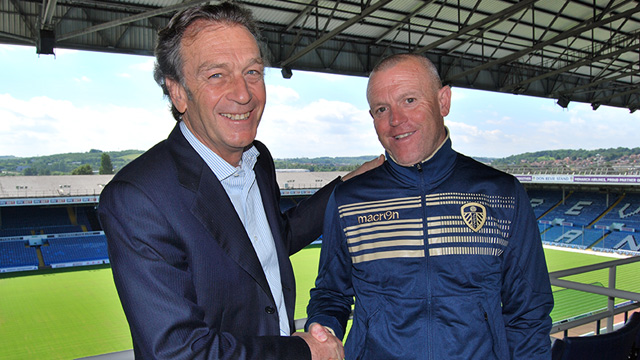 experience help me to know what I'm doing.'
experience help me to know what I'm doing.'
Hockaday was shocked, he had thought Cellino wanted an assistant manager
or an Academy coach. He was initially reticent, saying, 'I've got a reputation
as a decent coach - but the Leeds fans and the media will be saying, "David
who?" Are you prepared for that?'
The headstrong Cellino was steadfast and quickly made Hockaday an offer
he simply couldn't refuse. Hockaday was well aware of Cellino's record
with coaches but just could not resist the opportunity. His hope was that
Leeds would bring in some decent players and he would be given a fair
run at the job.
The fans were utterly unimpressed. A poll on the waccoe.com website
had less than 1 per cent of voters supporting the appointment and 74 per
cent rejecting it. 26 per cent were at least prepared to give him the
benefit of the doubt, though one sighed ruefully that there was 'no choice
but to give him a chance … I don't think it's a good choice but I don't
think Cellino gives a sh*te.' Another fan retorted, 'The give him a chance
crew are what's wrong with our club.' When asked, 'Who do you want to
be the manager after Hockaday is sacked?' one wag suggested Mr Bean!
Cellino, who declared that 'the town has a new sheriff,' closed Thorp
Arch over the summer months, closed its laundry and insisted that players
had to bring in their own packed lunches. The players were ordered back
to Elland Road early with several having to cancel their holidays, despite
not having received their wages after a winding-up order was lodged against
the club.
In an attempt to boost team spirit, Cellino introduced a rule dictating
where the players could live. 'Next season I do not want one single player
who lives outside of Leeds, no way. That is mandatory,' he told BBC Radio
Leeds. 'Last year there were players who were coming late to games. Next
year before a home game the players will stay together, have dinner together
and go to the game together.'
He also decreed that after away games the players would travel back to
Leeds together. Even if a game was on a player's home turf, they were
banned from visiting friends and family.
Cellino derided the squad he inherited. 'Leeds has got £18 million of
wages per year on the players,' he said later. 'For the sh*t team like
that! You should spend £5 million on wages not 18. With £18 million on
wages you can make a team that can really compete … I thought from the
beginning to bring Italian players, because I come from Italy and know
very well Italian players, but it is wrong because I am in England. I
have to get most possible English guys, or international players. Because
Italian players, they are good players, but, you know, I'm Italian, they
don't speak English in Italy. It's very hard for them go from Italy to
Leeds. It's always raining there. You know? It's a different country.
They have different meals. They have the risk to fail, you know, very
easily.'
Nicola Salerno was brought in as director of football. He had worked
for years alongside Cellino, who rated his deal-making abilities. Salerno
took the lead on identifying and recruiting players.
United agreed an £11 million fee with Fulham for McCormack, who accompanied
all Warnock's war horses out of the club.
'Ross McCormack is a beautiful player,' Cellino explained. 'I didn't
come to Leeds to sell Ross McCormack. But for him I was nothing, a new
owner, he's got a lot of money from Fulham, the chance to live in London.
What can I say? I love you McCormack, stay with me? He doesn't give a
f***. He didn't show up to training. He didn't fly with the club to pre-season.
I was so pissed off that when Fulham called me, I asked them for £10 million
to make them not buy the player. They said yes! Bloody hell.
'David Hockaday, the first day he heard McCormack wanted to go, he said,
"I don't want him in pre-season, sell him." I told Hockaday, "Did I ask
your f***ing advice? No. So shut the f*** up".'
Hockaday was frustrated when his suggested signings, Nigel Reo-Coker
and Nile Ranger, were dismissed by Cellino, who was the key decision-maker
in terms of targets.
'He'd send me a video and say, "Here's who we want to sign." I'd look
at the video and go, "No, I don't like him." He'd say, "Well, we're going
to sign him anyway." He got this centre-half. 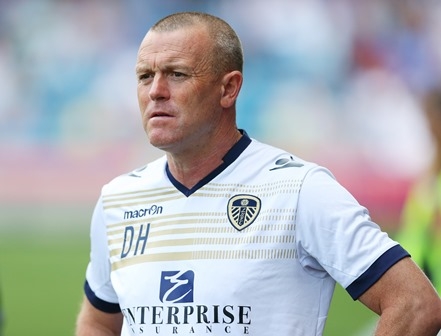 He
was a giant Scandinavian, playing in the Italian League. He said, "What
do you think of him?" I said, "No good." His face dropped. He was raging.
I said, "Watch him in training." The next day we had training, he watched
him, and by lunchtime he said, "He's gone."'
He
was a giant Scandinavian, playing in the Italian League. He said, "What
do you think of him?" I said, "No good." His face dropped. He was raging.
I said, "Watch him in training." The next day we had training, he watched
him, and by lunchtime he said, "He's gone."'
Hockaday's recruitment suggestions fell largely on deaf ears. 'I said
we needed a leader. Cardiff said we could have Mark Hudson for free, but
Cellino said, "No, I don't fancy him, who else?" I said.
Desperately in need of a central defender, Hockaday recommended Virgil
van Dijk, then of Celtic, Craig Cathcart and Mark Hudson. A move for Conor
Coady, available on a free, never made it past Cellino either. 'Flipping
heck,' recalls Hockaday, asked later about what might have been. 'Don't
make me cry. I was scratching my head being told no about those I had
recommended while we were getting in these Italian-based players who were
nowhere near it and, I have got to say, that's what killed me.'
Instead, Salerno brought in a series of unknowns from Serie B, including
Marco Silvestri, Tomasso Bianchi, Gaetano Berardi, Mirco Antenucci, Casper
Sloth, Souleymane Doukara and Giuseppe Bellusci. In the fullness of time,
Salerno brought in the 20-year-old Brazilian, Adryan. There was also a
group of British professionals with EFL experience including Billy Sharp,
Liam Cooper and Stuart Taylor, and there was also the somewhat bizarre
signing of Nicky Ajose from Peterborough.
back to top
Pre-season preparations were bizarre, ill-thought out and chaotic. Cellino
paid for the team to go out to Italy. Three games were scheduled, including
one against a Romanian side. Hockaday never thought they'd show up for
the match and he was proven right. He had to split his group into two
teams and have them play a match against each other to entertain the few
hundred Leeds fans who had shown up.
Hockaday named Jason Pearce as captain and went with a 4-3-3 formation
for the opening day at Millwall, giving debuts to Ajose, Silvestri and
Doukara. Leeds were disappointing, never in the game after conceding after
eight minutes and lost 2-0. On the upside, Silvestri gave a splendid display
in goal, a superb shot stopper. He prevented a heavy defeat.
A crestfallen Hockaday commented, 'From last season we wanted to change
the philosophy at the club and get the players comfortable on the ball
… If you get a number of passes and then they start to press then that's
when you get through them, over them, around them but you get behind them
with quality. We didn't do that. We kept passing for passing's sake, inviting
more and more pressure. First half we didn't perform, didn't stick to
the game plan … Football's about moments and we didn't handle the moments
as well as they did. We learnt a lot about our players and how they can
handle the big occasion. We wanted to stop them carrying out their game
plan, which is lots of diagonals, and we allowed them too much time to
do it.'
Teenage midfielder Lewis Cook, who helped England Under-17s win the European
Championships in Malta in May, came off the bench at Millwall and was
given his first start in the Capital One Cup against Accrington Stanley.
Hockaday also took the opportunity to blood Taylor, Bianchi and Berardi.
Two first half goals from Doukara had Leeds sitting pretty, and the Senagelese
striker came off to a standing ovation in the 80th minute. The way he
took both goals showed us that here there was a match winner in the making,
not a poacher, but someone who could finish sublimely from the edge of
the box.
Doukara's withdrawal marked the start of a frenetic final ten minutes
as James Gray pulled a goal back four minutes later. With Leeds fighting
to retain their lead, Berardi, who had enjoyed a 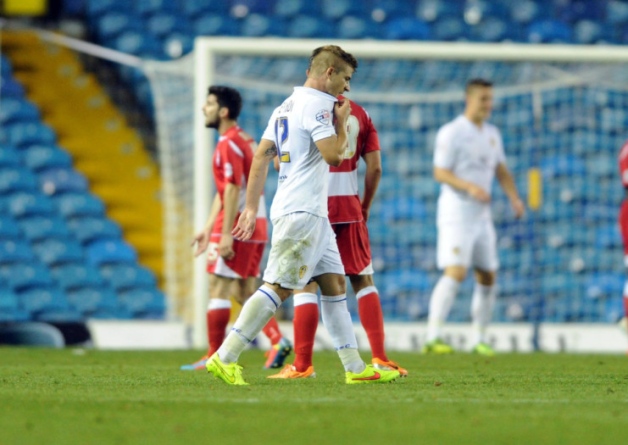 promising
debut, threw himself into a flying waist-high tackle on Stanley substitute
Rob Atkinson in the final minute and was instantly red carded.
promising
debut, threw himself into a flying waist-high tackle on Stanley substitute
Rob Atkinson in the final minute and was instantly red carded.
United saw out five minutes of added time, but it had been too close
for comfort after a smooth first half performance when they had looked
superb.
It was an infamous beginning for Berardi, a 25-year-old utility defender
who won a full Swiss cap in 2011 after 20 appearances for the Under-21
side. He moved to Sampdoria in 2012 after starting his career at Brescia.
He made a steady impact but struggled for games in 2013/14 and had been
made available by the Italian club.
'He's a good guy,' said Cellino. 'Played 150 times in Serie A, and he's
a national team player but he wants to come. The agent of Berardi is a
good friend of mine. He said he wanted to go to Cellino in England. I
said, "how much do you want?" and offered less. If you're good, you'll
get a bonus. You have to show me that you want to come here, not for money.
When you sign players, you can always raise the wage. You can never lower
the wage. So if you trust yourself then trust me. I'm not going to take
advantage.'
Liam Cooper and Billy Sharp, both signed during the week, made their
bows when Middlesbrough were the visitors to Elland Road.
Sharp was a big name in the Championship, having scored more than a century
of goals for a variety of clubs, but Cooper was less well known, a 22-year-old,
left-footed centre-back, Hull-born but a lifelong supporter of Leeds,
he claimed. His father's Scottish birth qualified him to play for Scotland
and he had won caps at Under-17 and Under-19 levels. He began his professional
career at Hull City, where he made his Premier League debut in September
2009 at Anfield, aged just 18.
To some debutants, the experience could have been confidence-shattering,
but Cooper was made of stern stuff. He made nine more league starts for
Hull and gained experience through a series of loan deals before signing
permanently for Chesterfield in January 2013. It was there that he made
his name, helping them achieve promotion to League One and he was named
in the PFA Team of the Year. Following the departure of Tom Lees to Sheffield
Wednesday during the close season, Cooper came onto the radar of Salerno
and Hockaday during a drawn friendly between the two sides.
Cooper's background and attitude impressed Hockaday, a veteran of 600
or so games in a playing career spent in the lower divisions. United quickly
came in with a bid which they eventually upped to £475,000, but Chesterfield
demanded £1 million. Leeds returned with an offer of £600,000 up front,
to rise by £200,000 if United got promoted.
Leeds did well, far better than expected. Outplayed for 25 minutes, they
began to work things out, blotting out the influence of Boro playmaker
Lee Tomlin and dragged the visitors into the type of intense, snapping
football that Aitor Karanka's team didn't appreciate. And Billy Sharp
rounded it off with a goal in his first appearance, perfectly timed at
88 minutes to prevent any meaningful response.
Goalkeeper Tomas Mejias fumbled Michael Tonge's shot and Sharp was in
where it hurt, pouncing to touch home. The shirt came off to show that
he wasn't really a fat lad from Sheffield and he was up and running.
But one swallow doesn't make a summer. The Middlesbrough game was the
one game of his time at the club when Hockaday made perfect sense, when
it all clicked and he got it right.
The following Tuesday, all the brittle confidence that had begun to build
came crashing down to earth as Leeds came a cropper in their home game
with Brighton.
In the absence of the injured Doukara, Hockaday dispensed with the 4-3-3
formation he had used thus far and went 4-4-2. He recalled Tonge to midfield
and brought Smith in up front to partner Sharp, with Ajose consigned to
the bench. The change never got the chance to work. Within five minutes
Brighton snatched the lead, breaking swiftly from midfield. Teixeira was
played into space to drive the ball across Silvestri and into the far
corner from a tight angle. There was a deafening silence. The tension
in the home side's football was palpable and the lack of width painful;
Murphy, Austin, Tonge and Bianchi were like static training ground dummies,
slack-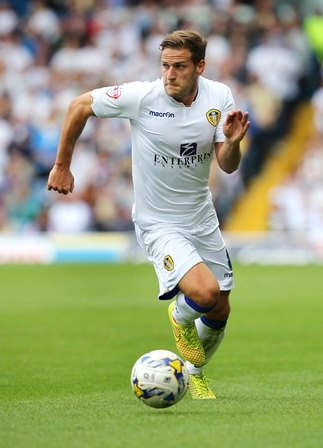 jawed
and leaden-footed. By contrast, the fleet-of-foot Brighton midfielders
buzzed round and through Leeds' line, seemingly at will. Leeds could not
match their verve and enthusiasm.
jawed
and leaden-footed. By contrast, the fleet-of-foot Brighton midfielders
buzzed round and through Leeds' line, seemingly at will. Leeds could not
match their verve and enthusiasm.
Hockaday withdrew the ineffective Smith and United stopped pumping the
ball aimlessly into the night air and began passing to feet. They improved
a little, and Tonge should have done far better when he was on the end
of a beautiful passage of instant passing. But Leeds never hinted that
they could recover the game.
back to top
Substitute Rohan Ince raced into the clear from a through ball but clipped
his effort wide off the post. Brighton were not to be denied, however.
When Pearce hacked his man down on the very edge of the box six minutes
from time, Brighton appealed for the penalty and they had every cause
but it didn't matter. The Leeds wall jumped to meet the non-existent chipped
free kick and LuaLua stroked the ball beneath them and into the unguarded
net.
Hockaday mumbled some inane drivel about the players putting a shift
in, but it was clear that he had not a clue.
Bellusci and Antenucci debuted the following week but could do little
as Watford won 4-1, with the defender getting his marching orders.
Cellino knew in his heart that the appointment of Hockaday was a mistake,
but he gave him one last chance. The reprieve was temporary. After a dismal
Capital One Cup defeat to Bradford City, the axe fell and Hockaday was
gone. He would not be missed.
The pedigree of Hockaday's replacement, Sturm Graz coach Darko Milanic,
was better, but when asked about his qualities, all Cellino could say
was 'I don't know [why I've chosen him]. The coaches are like watermelons.
You find out about them when you open them. His particular qualities?
He's good-looking, what can I tell you? He does not talk much and is very
pragmatic. I like him. He is a very cool guy.
'I took my time because I wanted the right man. If I rush we burn and
I could not afford a mistake. Darko is a humble guy. He talks little but
he works a lot and he's a coach who knows about international players.
He's hard-working, he's positive…He speaks a lot of languages, he can
work with foreign players - English, Italian, any nationality - and he
can relate to foreign players. When I spoke to him, I knew that he was
right for us. His style and his philosophy is right for us.
'Darko needs time now, he needs to work, but we have a good team and
we've had good results. He can do well for us.'
Cellino had spoken with Steve Clarke, Oscar Garcia and Simon Grayson
but singled out Milanic as his man, pointing to his achievements as a
coach during his five-year reign at Slovenian club Maribor where he won
nine trophies.
He chose to overlook the potential of Neil Redfearn who had delivered
impressive victories against Bolton, Bournemouth and Huddersfield after
taking charge temporarily. Cellino was clear that he would not be appointed,
despite saying initially, 'At this moment I can't see anyone better than
him to look after the team.'
Milanic hadn't come cheap; activating the release clause in his contract
cost more than £200,000 and Cellino dangled a salary of £400,000 to attract
him.
Milanic was confirmed as the first foreign boss in United's 95-year history
hours after handling a training session at Thorp Arch. He seemed to have
everything that Hockaday lacked: a celebrated playing career, international
caps and a managerial track record.
'I'm very motivated and excited about my new job,' he said without a
hint of joy in his eyes. 'This is a very special thing for me to be the
head coach of such a big club with great tradition and great fans. For
me this is a great opportunity to improve myself and also the team.'
He was quietly spoken, uttering his words in a matter of fact style,
betraying little emotion.
'I know that the team is now in a good shape and this is a very good
moment for the team. After my first training session and first game I
will know everyone better. My first job is to get to know each 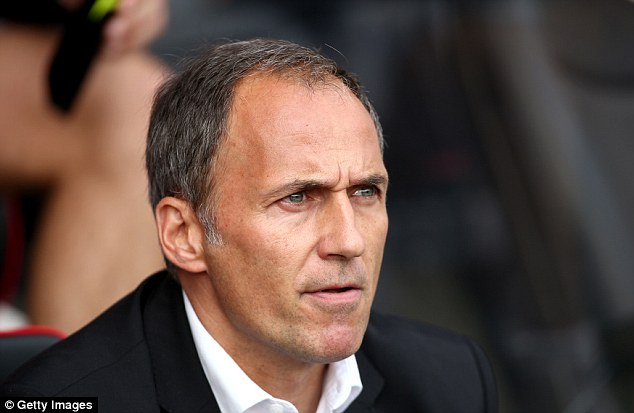 player
individually. I will talk with my team about Saturday's opponents. I know
that it will be very tough but the team has to move forward. The team
needs to continue the form like the last few games.'
player
individually. I will talk with my team about Saturday's opponents. I know
that it will be very tough but the team has to move forward. The team
needs to continue the form like the last few games.'
Redfearn had done well, very well indeed. Three wins and ten points from
four games saw United climb from 21st to eleventh, two points outside
the Play-Offs. The players seemed to like him, to have recovered all the
enthusiasm and spirit they had lost under Hockaday.
Things worked in his favour, mind. Bolton and Birmingham had both been
struggling. Leeds beat the former and then earned a point at St Andrews.
In the first hour at Bournemouth, Leeds had been murdered and were a
goal behind before coming back to somehow win 3-1 and then there was a
3-0 thrashing of a very poor Huddersfield.
But you can only deal with what is put in front of you and Redders had
certainly done that.
Redfearn hit immediately on the right formula, giving first Championship
games of the season to Lewis Cook, Alex Mowatt and Casper Sloth in midfield
at the expense of Michael Tonge and Luke Murphy, whom the fans had never
taken to. He also saw Bellusci and Pearce building a decent partnership
at centre-back, although the Italian was continually betrayed by his dark
side, and Doukara and Antenucci delivered in front of goal.
Antenucci, especially, showed an extraordinary cutting edge. You could
see he was a true goalscorer, one who knew what he was doing and who could
be relied on to take the half-chance.
Cook, Mowatt and left-back Charlie Taylor, who replaced the injured Warnock
against Bolton, were graduates of Redfearn's Academy and he said, 'The
young lads here are good players and I've worked with them for years.
For me, it wasn't a gamble playing them. Lewis is an outstanding talent
and I thought he was the best player on the pitch. He's beyond his years
and I told the president that at the start of the season. I said, "playing
in front of Elland Road won't faze this kid." But this is what these young
players should be doing - they should be lifting the level and the standard
and pushing the seniors. All of the players were brave in a lot of aspects.
It got them a result.'
17-year-old Cook was a playmaker beyond his years, a wonderfully gifted
midfielder, and 19-year-old Mowatt seemed to have a golden touch in front
of goal. It was his precise finish that secured the point at Birmingham.
That sort of turnaround in form would have got Redfearn the job at most
clubs. But not a bit of it with Cellino, who said as he appointed Milanic,
'I'm not saying Neil wasn't good enough for the job. He was good enough.
He was one of the few good things I got when I bought this club - some
of the value I got. But to appoint him would have been too easy. If I
do that, I'd be taking a big risk with the Academy. People know me, they
know I don't like throwing money out of the window, so if it was all about
money then I'd have Redfearn as head coach and not pay somebody else.
It's not about money. Neil is part of the history of this club, he does
great things with the Academy and I don't want to waste that.'
back to top
Milanic took charge for the first time away to Brentford and it was a
case of 'steady as you go'. Sam Byram returned for Gaetano Berardi, suspended
after the second dismissal of his nascent Leeds career against Huddersfield,
and Mowatt took the place of Sloth.
The tactics remained the same but the performance was noticeably less
enthusiastic. Brentford scored in the closing stages of each half to register
a 2-0 win that was more emphatic than the scoreline hinted. In between,
goalkeeper Marco Silvestri enhanced his reputation with a succession of
decent saves and Brentford sent a penalty ballooning into the stands.
Milanic had indicated that Redfearn would join him in the Griffin Park
dugout but, having been overlooked for the head coach's job, Redders declined
to travel though he offered Milanic plenty of advice and insights on the
Championship.
Mowatt was the best of a disappointing midfield but it was not until
he was replaced by Sloth midway through the second half that United displayed
any real urgency.
'We have to get better,' said Milanic at the end. 'This game, it was
not the limit of the squad. We have to do better. The players have to
do better in the next game.'
Fans were divided. 'Too early to write him off' said the Darko apologists,
adding, 'I doubt very much that Milanic was solely responsible for that
team having taken only a few 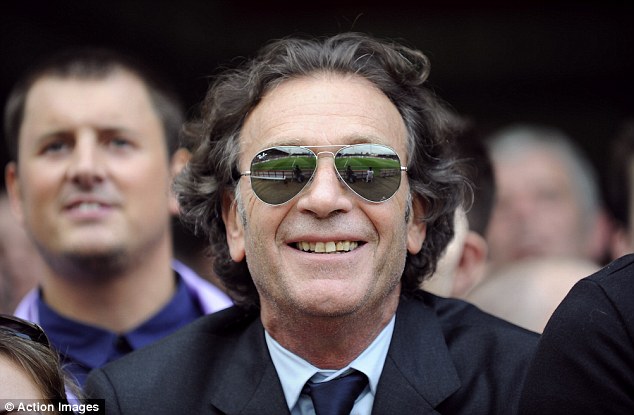 training
sessions with players he won't have known a great deal about.'
training
sessions with players he won't have known a great deal about.'
The anti-Milanic brigade pulled no punches: 'Never mind losing the dressing
room, he's never found it,' said one, adding, 'The players don't want
to play for him.'
But in the main it was about Redfearn. He should have got the job and
it was no time to change the coach. One of the more eloquent statements
said, 'It would have made more sense to keep Redders on with a little
sign around his neck saying, "When finished with, please return me to
the Academy." Cellino is a highly temperamental man when it comes to his
coaches and they are not afforded much time. Redders already had momentum
and that could have done us a lot of good in terms of how high we finish
this year.'
But there was hope that two home matches in a week, against Reading and
Sheffield Wednesday, would offer the proof of the pudding. 'We should
be able to do these two.'
'We are motivated and we have had some good training sessions,' said
the coach. 'I learnt a lot from the Brentford game. I now know the players
a lot better and I know how it works in this league. I knew before that
game that there will be no easy games. Wednesday will be the same, it
will be another difficult game … We have to set the tempo and the dynamic
of the game. We need to be aggressive.'
Sloth came into a midfield which offered little invention at Brentford
but, though Rudy Austin's omission made sense, the absence of Stephen
Warnock at left-back was more of a surprise. He had been United's most
dependable outfield player but Milanic turned instead to Liam Cooper,
using a centre-back to plug that side of his defence.
Warnock's demotion came in the aftermath of criticism by Cellino after
the defeat at Brentford, though Milanic took responsibility for the decision,
saying he had used Cooper to combat the threat of Reading winger Nick
Blackman.
Cellino had tried to instigate Warnock's substitution during the defeat
at Watford in August, but his phone call to the dugout was ignored by
David Hockaday.
The left-back considered bringing in the PFA but instead chose the moment
after scoring the winner against Bolton. His mocking celebration had him
miming a telephone call and a hands rolling request for a substitution.
Cellino was not amused.
There was certainly more fire than had been on display at Brentford,
but Leeds found themselves outpassed for long passages. Goalkeeper Silvestri
was in regular action while at the other end they did not force a save
out of Adam Federici until substitute Sharp tested him in the 85th minute.
'We made too many bad final passes,' sighed Darko.
A big local derby against a side who had put six past Leeds in January
would surely be enough to stir the United players. Wednesday feared a
backlash, but only Pearce, Austin and Mowatt of that starting eleven were
still at Elland Road, emphasising the scale of change under Cellino.
The pre-match words of Milanic suggested cool heads rather than fiery
passion was the way. 'You have to take the right direction, not too emotional.
You have to be very intelligent to play these games. You have to be motivated
but in the same moment you have to control your emotions.'
He recalled Berardi and Austin for Cooper and Cook, Milanic deciding
that the 17-year-old needed a rest. Leeds started the brighter of the
two teams. With Bianchi pulling the strings from the base of a midfield
diamond and Mowatt's energy giving direction, United carried a very real
threat.
On 13 minutes, the duo combined well as Bianchi played Mowatt through
and the teenager brought a brave block from Kieren Westwood. The Owls
goalkeeper then had to show his agility to tip over a swerving 35-yard
effort from Austin, while Doukara dragged a shot just wide during an impressive
start. Antenucci looked to have put the home side ahead when he latched
onto Austin's slide rule pass to slip the ball under Westwood, but he
was deemed offside.
Wednesday struggled to match Leeds' attacking thrusts during that first
half but took the lead seven minutes after the break. Jacques Maghoma
found Chris Maguire on the right side of the penalty area and the winger
arrowed a right-footed shot into the bottom corner of Silvestri's net.
In the minutes after the goal, both sets of players lost their heads
and referee James Adcock showed five yellow cards inside five minutes.
back to top
Berardi got involved in a dispute with Maguire about not much at all;
when Bellusci intervened passionately, half the Wednesday team were dragged
into the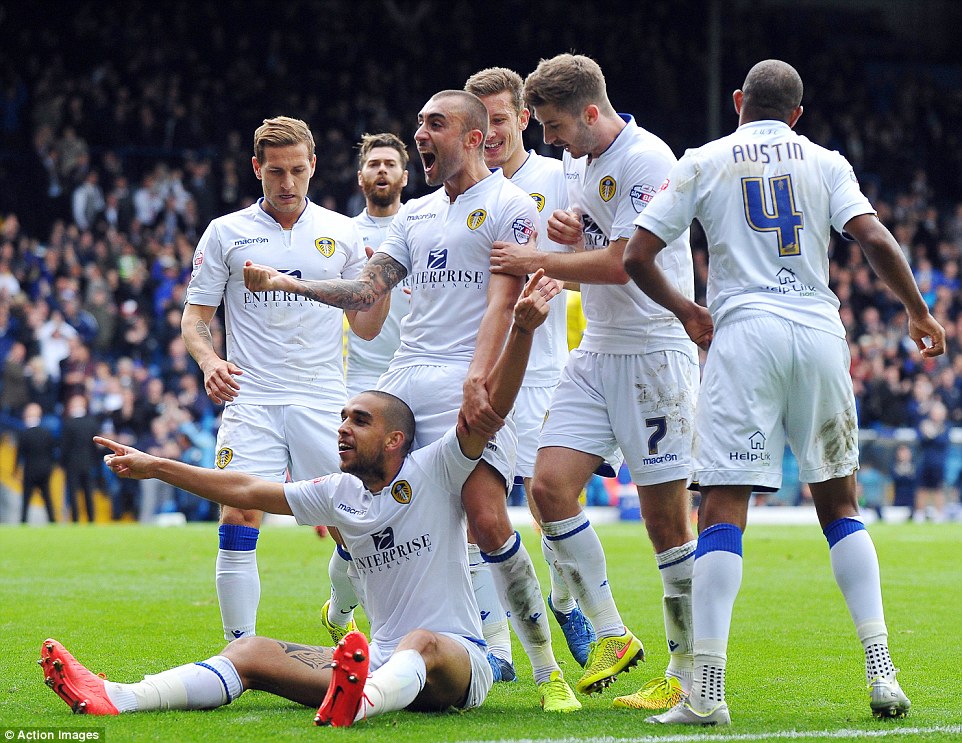 altercation. Bellusci, Berardi and Maguire all received yellow cards for
their trouble.
altercation. Bellusci, Berardi and Maguire all received yellow cards for
their trouble.
It stayed the momentum that Leeds had been building but they managed
to salvage the game with eleven minutes remaining. The ball fell to Bellusci
in space on the left after a Mowatt free kick and the Italian hit a nicely
controlled low effort back through the legs of several defenders. It could
have gone anywhere, but it rolled into the far corner with the keeper
nowhere.
Bellusci also endeared himself to many when he gave his shirt to a disabled
supporter at the end. Milanic pronounced himself content with the point
though Leeds were slipping down the table. Nevertheless, supporters were
still willing to give him the benefit of the doubt.
The international break gave him the chance to instil his ideas in the
players not on duty and surely a fixture away to Rotherham would offer
the sort of opportunity needed after some difficult games. Milanic recalled
Cook and Warnock for Sloth and Byram and Leeds again started well, pouring
forward at every opportunity.
After eight minutes, Mowatt ghosted past several Rotherham defenders
but Antenucci could only prod his cross wide of the upright.
Rotherham were enjoying their best spell when Leeds took the lead. Doukara's
precise pass allowed Antenucci, with a well-timed run, to spring the offside
trap and finish calmly.
Leeds finished the half well and looked like they would get the win that
Milanic craved but things disintegrated after the break and Leeds were
suddenly pushed back. When Silvestri could only parry Ben Pringle's rasping
shot, Alex Revell applied the simplest of finishes to restore parity.
Jubilation inside the New York Stadium had hardly faded when second half
substitute Jonson Clarke-Harris collected the ball unopposed 30 yards
from Silvestri's goal. The former Coventry striker strode forward to smash
the ball beyond the despairing dive of the keeper to complete an amazing
turnaround.
Antenucci almost provided two thousand visiting supporters with 84th
minute salvation but his drive was tipped on to the post by the keeper.
Milanic was downbeat after the game. 'We tried to play football but it
wasn't enough. At the beginning we did very well. We had the game under
control and we had good possession. Our opponents were not dangerous,
we were. We scored our goal and in the last few minutes of the first half
they put crosses into our box and used long throws well and they put us
under pressure. In the second half they started really well and put us
under a lot of pressure. There was a lot of challenges in our box. This
is a good style of football for them.'
Milanic had wanted to give a start to Adryan, the Brazilian wonderkid,
but Cellino insisted he remain on the bench. A 'club insider' confirmed
that Cellino ordered Milanic to leave him out, despite the Italian not
even being present at the game. His absence was apparently because the
game was being played on 17 October - a number Cellino deemed unlucky.
Adryan was brought on after 60 minutes and showed much. He had three
shots but it was his build-up play which caught the eye. With twists and
turns aplenty, the playmaker looked Leeds' brightest player in the second
half, prompting Milanic to comment, 'Adryan was very dangerous. He made
good movement in between the lines. He played very well for 30 minutes
and did a good job.'
Despite the setback, Milanic's main concern was the team's inability
to do the business for a full 90 minutes rather than the odd part of a
game.
On the notion of pressure, he added, 'My job in every moment is under
pressure. But I have to be calm and work hard. My job is to improve. We
have played not bad and in the last three games, we have shown a lot of
quality. But I know that we need the points. In football and at this level,
it is normal that we have this. It is a big club in a very good league.
It is normal we have all pressure. In the four games, we have not made
a lot of points. But we are not a bad team … We are competitive and the
differences are not too big in each game.'
Milanic gave Adryan his first start against Norwich, benching Cook, and
persisting with his preferred diamond in midfield. Norwich had the wit
and the width to expose the deficiencies of the system and for most of
the 90 minutes it was Peacocks defence against Canaries attack, with a
series of hurry scurry escapes in the Leeds box. The inevitable breakthrough
came in the 59th minute when Martin pushed away his marker and headed
in a corner, unmarked, from 12 yards.
Four minutes later Leeds levelled when Adryan played Doukara in on the
edge of the area. He evaded three City defenders and drove the ball past
goalkeeper Ruddy from 20 yards for his fifth goal in ten starts.
On the downside, the yellow card he picked up was his fifth of the season
and would keep him out of the following game.
back to top
The match was overshadowed by claims that Bellusci directed a racist
remark at Norwich striker Cameron Jerome midway through the first half
when the pair scuffled with the ball miles away. Silvestri got between
them to prevent a nasty incident.
Referee Mark Clattenburg took Jerome to the bench and spoke to City manager
Neil Adams and the fourth official, before also having a word with Bellusci.
No further action was taken at the time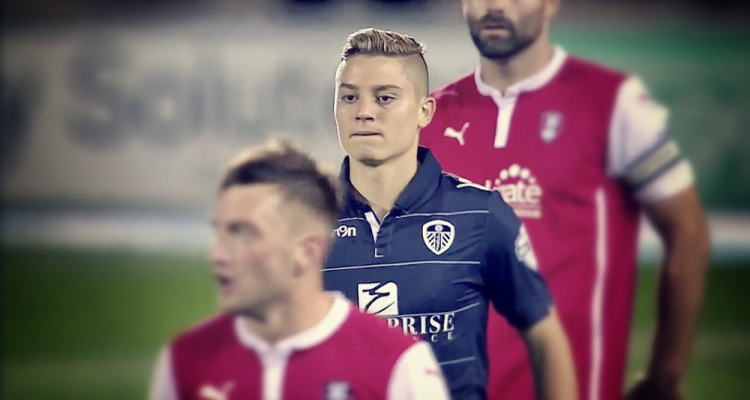 but moments later Jerome was booked for a heavy challenge on the Leeds
defender.
but moments later Jerome was booked for a heavy challenge on the Leeds
defender.
Milanic would not be drawn on the incident. 'It is difficult for me to
comment on something which is new for me and I will leave it to other
people in the club to deal with.'
By sharp contrast, Cellino seemed very clear about exactly what had happened.
'Bellusci is no racist,' he insisted. 'I spoke with him and he said, "you
must be joking, I said nothing like this to him." He is surprised by this.
He is shocked. I don't allow racists at this club and I won't allow racists
at this club ever. If one of my players is a racist, I'll kick his a***
and kick him out before the FA has a chance. Bellusci says he spoke in
Italian. I don't know if he speaks Italian too but Bellusci swears to
me he said nothing racist. He was pissed off, sure, because he got hit
in the neck and the face but he denies anything racist. I believe him
and I'll support him.
'I'll write to them to clarify my position on Bellusci and racism. If
any Leeds player was shown to be a racist, he'd be out. That's my philosophy
and my promise.'
It was February before Bellusci was cleared by an independent regulatory
commission which dropped the case at a personal hearing. Bellusci denied
the charge and was found to have been threatening to give the striker
'a black eye'.
The following Saturday in Leeds was bright and breezy but there were
storm clouds gathering round Elland Road for Milanic as he prepared his
team to face high-fliers Wolves. Leeds were five points above the relegation
places and slipping inexorably down the table. As Cellino waited sulkily
for another tax evasion hearing in Italy, it was rumoured that he had
been intensely critical of Milanic after an overly defensive display at
Carrow Road and was considering a change of leadership.
Milanic had left his family behind in Austria, saying, 'My family will
stay in Graz because my daughter is at school there. It's the first year
in an Austrian school and if she changes one time for a second year, I
think this is not good. I think it's better they stay at the moment and
then we'll see. But it is beautiful here. When someone comes here from
Europe, I think they will be surprised by Leeds.'
He had nevertheless arranged for them to come over to watch the game
with Wolves and was looking forward to seeing them again. They would never
forget the few hours they spent at Elland Road.
Other invitations were made. Nicola Salerno contacted Neil Redfearn on
the Friday and told him, 'Come to the game on Saturday, you need to sit
with Mr Cellino.' In that moment, Redfearn sensed that Milanic's time
was up.
Steve Morison got his first start in a Leeds shirt in almost 18 months,
replacing Doukara, while Warnock and Cook took the places of Byram and
Austin.
Despite the pressure on Milanic and five games without a victory, Leeds
were good in the first half, taking the game to opponents who were fourth
in the table. Mowatt and Cook were lively and inspiring in midfield and
Antenucci looked exceptional up front, a real striker for a change after
some of the lacklustre plodders that had trod the Elland Road pitch over
the last four years. But the star of the show was Adryan, exciting and
tricky as he stormed around the middle of the pitch. Every time he picked
up the ball and raced forward there was a roar of excitement from the
crowd.
After all the narrative about negative football and Milanic's conservative
approach, this was football fit for the gods. Wolves were harried out
of their normal game and one could have been excused for thinking that
it was Leeds who were in promotion contention rather than they.
The opening goal that Leeds merited came after 18 minutes after Mowatt
found Morison down the right channel with a 40-yard pass. The striker
collected smoothly 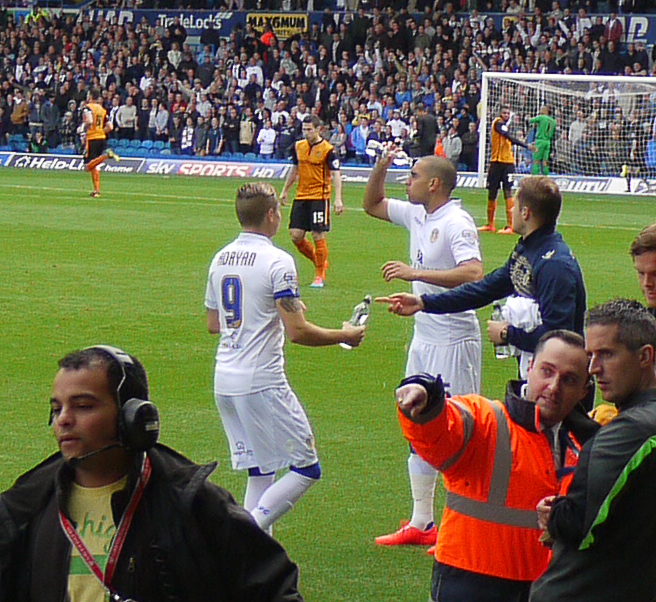 and
passed inside to the oncoming Antenucci who sized up the opportunity before
firing the ball through a defender's legs and in off the inside of the
post. It was a wonderful goal from a striker who was enjoying life.
and
passed inside to the oncoming Antenucci who sized up the opportunity before
firing the ball through a defender's legs and in off the inside of the
post. It was a wonderful goal from a striker who was enjoying life.
Wolves had no initial response, but manager Kenny Jackett changed things
round at the break, replacing David Edwards with Leon Clarke. Instantly,
the visitors started to improve.
Milanic's natural caution surfaced as he decreed that Leeds should fall
back and protect their slim advantage while the crowd bayed for them to
get back on the front foot. It allowed Wolves to exert midfield control
and the tide became one way.
In search of order, Milanic brought Murphy on for Mowatt just after the
hour to howls of derision. Within two minutes Wolves had equalised, winger
James Henry benefiting when the ball bounced off Bellusci's knees deep
inside the area. An unmarked Henry lashed the ball into the roof of the
net.
Milanic attempted to stem the tide by sending on Sloth for a tiring Adryan
but Wolves upped their efforts and cut Leeds apart with five minutes left.
The visitors were allowed to advance into the box with a smart passing
move with scant resistance offered. When the ball was squared to the back
post, Clarke thundered home the winner.
A disconsolate Milanic meekly shook Jackett's hands at the finish, seemingly
unable to take in what had just happened. 'We lost control of the match,
we lost our passing play in the second half. It was very good, we created
opportunities, we played well, the opposition were not really dangerous.
It was a good performance on our side, we scored the goal and made a few
chances. We were prepared, we talked about this moment in the dressing
room that we have to begin like we began in the first minutes, this means
we have control and pass the ball, but it didn't happen. This means the
opposition did well and we had problems with them. We are not a team with
a lot of experience. That is clear to see in the game. We cannot maintain
the same level in the game. We played well, very well in the first half
and then in the second half when the opposition were very dynamic and
played forward very quick, we had problems. We also lost our calm.'
Milanic said he believed he would improve the results, but fans had ceaselessly
chanted the name of Redfearn, who they could see sitting next to Cellino.
Within half an hour of Milanic's words, the club announced they had 'parted
company'.
'I want to apologise to the supporters, they deserve better results,'
commented Cellino after ending Milanic's reign after 32 days which had
yielded three points from six games. Leeds were 18th, three places higher
than when Hockaday had bitten the bullet.
'I have given the order to fire him. I made a mistake with this guy.
He is negative, he has a losing mentality. He has three points from six
games, that is relegation. Neil Redfearn will take training on Monday.
He is the new head coach, 100 per cent.'
'In six games with the team I made a big step forward,' insisted a defiant
Milanic, who was adamant that he had only been put on temporary gardening
leave and would be back. 'It is true that we had bad results but the day
before the game we had praise from all sides on how the situation was
improving. I do not believe I made a mistake in joining Leeds. I just
wish that someone would believe in me. Cellino said I'm a loser. He should
look at my CV.'
Part 2 There's Only One Neil Redfearn -
Results, table and transfers
back to top












 experience help me to know what I'm doing.'
experience help me to know what I'm doing.' He
was a giant Scandinavian, playing in the Italian League. He said, "What
do you think of him?" I said, "No good." His face dropped. He was raging.
I said, "Watch him in training." The next day we had training, he watched
him, and by lunchtime he said, "He's gone."'
He
was a giant Scandinavian, playing in the Italian League. He said, "What
do you think of him?" I said, "No good." His face dropped. He was raging.
I said, "Watch him in training." The next day we had training, he watched
him, and by lunchtime he said, "He's gone."' promising
debut, threw himself into a flying waist-high tackle on Stanley substitute
Rob Atkinson in the final minute and was instantly red carded.
promising
debut, threw himself into a flying waist-high tackle on Stanley substitute
Rob Atkinson in the final minute and was instantly red carded. jawed
and leaden-footed. By contrast, the fleet-of-foot Brighton midfielders
buzzed round and through Leeds' line, seemingly at will. Leeds could not
match their verve and enthusiasm.
jawed
and leaden-footed. By contrast, the fleet-of-foot Brighton midfielders
buzzed round and through Leeds' line, seemingly at will. Leeds could not
match their verve and enthusiasm. player
individually. I will talk with my team about Saturday's opponents. I know
that it will be very tough but the team has to move forward. The team
needs to continue the form like the last few games.'
player
individually. I will talk with my team about Saturday's opponents. I know
that it will be very tough but the team has to move forward. The team
needs to continue the form like the last few games.'

 but moments later Jerome was booked for a heavy challenge on the Leeds
defender.
but moments later Jerome was booked for a heavy challenge on the Leeds
defender. and
passed inside to the oncoming Antenucci who sized up the opportunity before
firing the ball through a defender's legs and in off the inside of the
post. It was a wonderful goal from a striker who was enjoying life.
and
passed inside to the oncoming Antenucci who sized up the opportunity before
firing the ball through a defender's legs and in off the inside of the
post. It was a wonderful goal from a striker who was enjoying life.